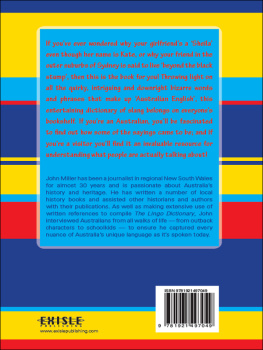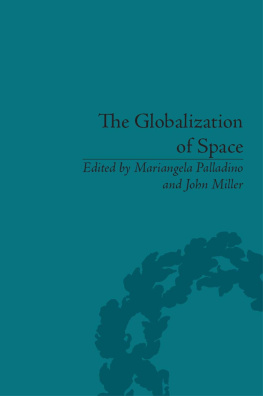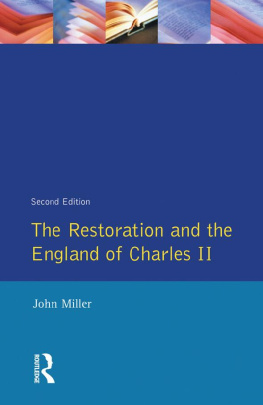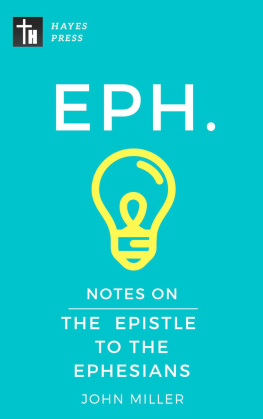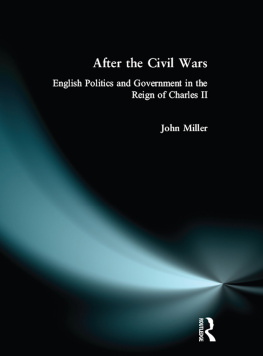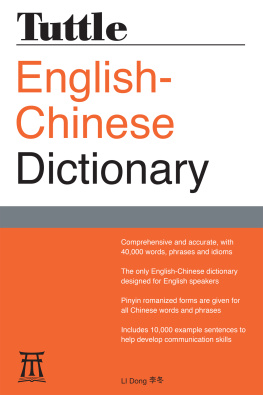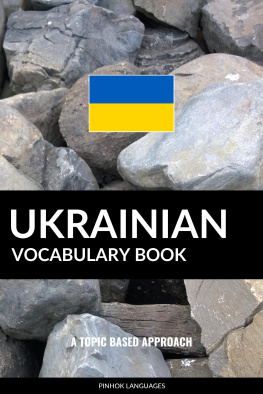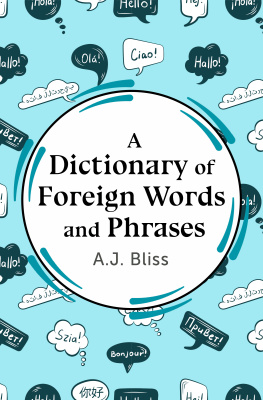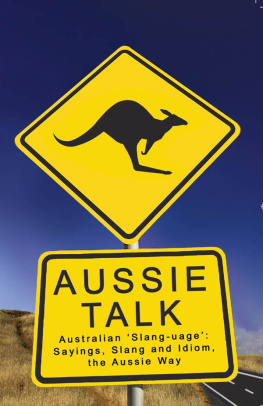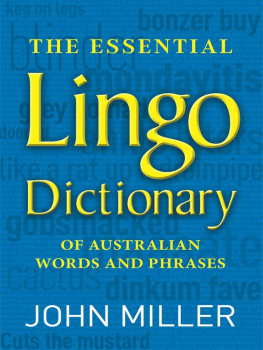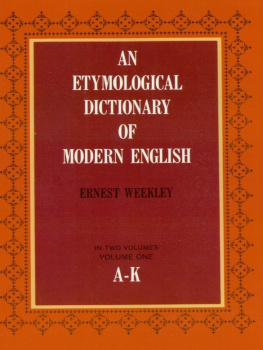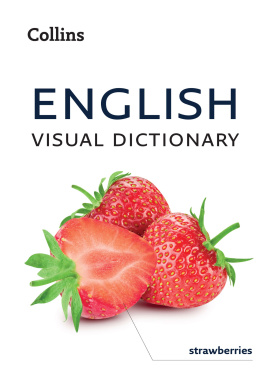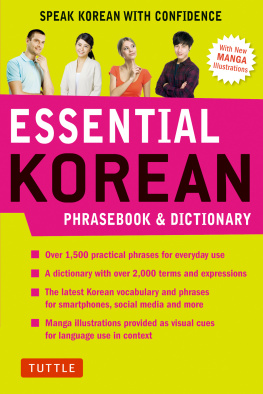The Lingo Dictionaryof favourite Australian words and phrasesJohn Miller
 | e-newsletter |
|---|
| If you love books as much as we do, why not subscribe to our weekly e-newsletter? As a subscriber, youll receive special offers and discounts, be the first to hear of our exciting upcoming titles, and be kept up to date with book tours and author events. You will also receive unique opportunities exclusive to subscribers and much more! To subscribe in Australia or from any other country except New Zealand, visit www.exislepublishing.com.au/newsletter-sign-up For New Zealand, visit www.exislepublishing.co.nz/newsletter-subscribe |
Introduction
The Australian language or lingo is a distinct and unique creature, one that has evolved from a mixing pot of cultures over the past 220 years and one that is continuing to evolve today. People from all backgrounds and nationalities have contributed to the lingo: Aboriginal, English, Irish, Scottish, Welsh, Chinese, other Asians, eastern European, Mediterraneans, New Zealanders, Pacific Islanders and Americans. Without this cultural mix we would not have the unique way of speaking the English language that helps make our lingo so interesting, and in many instances amusing. The spoken form of Australian English, or Strine where words are uttered with the mouth barely open and much use of the nasal passages to create a drawl (perhaps to keep out the flies) is very distinctive, especially when combined with the jargon, slang and colloquialisms used widely. There is the jargon associated with different occupations and activities, the slang of different age groups and different communities and the expressions that find favour with todays fashions and trends.
Accents vary slightly from state to state and sometimes even from region to region, and there are quite a few terms and expressions that are unique to states, regions and even population centres. Aussies have a penchant for shortening words or names and then adding an ie, o or y, such as in brekkie for breakfast, muso for musician and smithy for a blacksmith. Also a generally sounds more like an i to those from other nations and thus tailor sounds more like tiler. Our i often comes out as oye and thus a roof tiler sounds more like a toyler. Most words with a t or a double t are often pronounced with a d sound, such as in liddle for little. Another idiosyncrasy is that Australians dont often emphasise er at the end of words with the resulting sound being more like ah, such as in bee-ah instead of beer and weath-ah rather than weather.
The letter h is often pronounced as haitch with the emphasis on the aspirant h, but when this letter appears at the beginning of a word the h is often dropped altogether, such as in ere for here. Dropping the g at the end of ing words is also very common, such as in doin. Aussies also have a penchant for dropping letters to shorten words and thus government becomes gumment. Other words are lengthened, such as new which often become knee-yew, picture becomes pic-a-cha and nuclear becomes knee-yew-cle-ah. There is also a habit of dropping the l after a vowel, such as in Uh-stray-ee-ah for Australia. There are many terms associated with the rugged Aussie character which has been moulded by years of coping with a tough climate and even tougher conditions.
Thus there is emphasis on robust, crude and at times disgusting slang terms and sayings but it is part of the Australian psyche and, therefore, impossible to leave out of any material written about the language. As such some of the terms and expressions included in this book may offend some people. There are also quite a few terms no longer in common use and, of course, many new words introduced owing to new influences on the Australian culture. The Aussie lingo of today began on the ships of the First Fleet when a mix of convicts, settlers, soldiers and sailors spoke a variety of differing dialects and versions of British working-class slang. Among the words that would have made the trip to Australia and are now commonly used are bloke, booze, conk and bloody. When the convicts arrived on these shores many continued their habits from their former home and among the words they used are bludger, cove, nark, beak and dunny.
In Britain at the time there were many regional dialects and these too made their way to Australia, each bringing their own words, phrases and expressions with examples including fair dinkum, chook, dag, billy, larrikin, burl and fossick. Australia also saw many Irish immigrants who brought with them words like barrack, gob, shenanigans and youse. At the time of European settlement of Australia, the traditional owners of the land spoke more than 300 separate languages, many of which are now extinct. The Aussie lingo has borrowed many words from the Aboriginal languages, including budgerigar, dingo, kangaroo, koala, bindi-eye, yabby, boomerang, billabong, humpy, dilly, gibber, bung, cooee, yakka and yabber. As Australian English continued to develop its own path, new local slang terms were coined and there are many of them, including battler, bonzer, bottler, chunder, digger, drongo, footy, Gday, hoon, norks, ocker, perv, sanger, sheila and wowser. There are also many slang phrases, many of which indicate the robust nature of Australia and our love of humour, including happy little vegemite, map of Tassie, like a shag on a rock, dry as a dead dingos donger and not much chop.
I find the use of rhyming slang particularly clever and amusing. Rhyming slang first appeared among the cockneys of Londons East End and while there is some cockney rhyming slang still used in Australia, the vast majority of this form of language had its origins right here, probably due to our love of humour and satire. Cockney versions still used include plates of meat for feet and elephants trunk for drunk. Home-grown versions include bag of fruit for suit, billy lid for kid, Captain Cook for look, Reg Grundies for undies, Joe Blake for snake, horses hoof for poof and Noahs ark for shark. Often the rhyming word is dropped such as in Noah for shark, Joe for snake and Jack, short for jack in the box, rhyming slang for pox. Just as there are in Britain, there are many regionalisms that only exist in certain states or regions of Australia.
These are often based on geographical features or regional cultural differences. There are many examples, including those used to describe city-based four-wheel-drive vehicles that are seldom, or never, used in terrain that necessitates engaging the vehicles in four-wheel-drive, such as a Toorak tractor or Toorak taxi in Melbourne, a Dalkeith tractor in Perth, Burnside warrior in Adelaide, Kenmore tractor in Brisbane, and in Sydney a Double Bay tractor, Balmain bulldozer, Balmoral bulldozer, Mosman tractor, North Shore tank and Turramurra tractor. Although there are also overseas influences on our language, new slang is being invented every day by Australians to reflect new technology and shifts in cultural emphasis. Among the newcomers helping to further develop the unique Aussie lingo are doof , feral, filth, pov and bowlo. It is also interesting to note that a number of great Aussie expressions have also made their way overseas and even into the United States where crikey, no worries, onya and fair dinkum, among others, are becoming more widely used. There are also words and phrases in Australia that have died out as the generations have come and gone and as technology has advanced.
These include many of the military terms that came into existence during World Wars I and II when many Australians were involved with wartime operations. Terms relating to cigarette usage are also slowly dying out as anti-smoking measures are increased while a number of terms used to describe pre-decimal currency have not survived the transformation. If you are concerned about the loss of any of these expressions, just start using them again and they may be reinvented.
Next page
